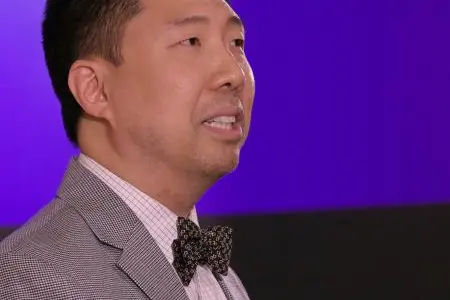PHOTO
Doha: The impact of the timing of umbilical cord clamping on the health of mothers and newborn babies was discussed at the first in a new season of Grand Rounds lectures at Weill Cornell Medicine-Qatar (WCM-Q).
Speaking to an audience of physicians, pharmacists, nurses and allied health professionals, Dr. Ben H. Lee, Medical Director of Neonatology Operations and Associate Chief Medical Officer at Sidra Medicine, discussed the existing research into how clamping the umbilical cord at different time intervals after birth affects the health outcomes of mothers and newborn babies.
Dr. Lee, who is an affiliate faculty member at WCM-Q, also explained the physiology of the baby’s transition from receiving oxygen through the placenta to breathing through his or her own lungs and analyzed the impact of ventilation and cord clamping on this transition. Finally, Dr. Lee identified the key to successful cord clamping to best protect the health of both mother and baby, explaining that delayed cord clamping often has better outcomes than immediate clamping, but that there was no ‘one size fits all’ recommendation.
He said: “Overall, the stability of your cardiopulmonary transition at birth from the fetal to neonatal state is dependent not on time, not on 30 seconds, 60 seconds, two minutes or five minutes; it’s dependent on appropriate sequence of [the baby] breathing first and triggering the pulmonary transition, which then triggers the cardiovascular transition. Once the cardiovascular transition occurs, then you don’t need the placenta and then you can go ahead and clamp.
“So, we should think of it as physiologic cord clamping, not just as delayed cord clamping.”
Dr. Lee’s lecture, titled The Key to Successful Umbilical Cord Clamping, was accredited locally by the Qatar Council for Healthcare Practitioners-Accreditation Department (QCHP-AD) and internationally by the Accreditation Council for Continuing Medical Education (ACCME).
About Weill Cornell Medicine - Qatar
Weill Cornell Medicine - Qatar is a partnership between Cornell University and Qatar Foundation. It offers a comprehensive six-year medical program leading to the Cornell University M.D. degree with teaching by Cornell and Weill Cornell faculty and by physicians at Hamad Medical Corporation (HMC), Aspetar Orthopedic and Sports Medicine Hospital, the Primary Health Care Corporation, the Feto Maternal Center, and Sidra Medicine, who hold Weill Cornell appointments. Through its biomedical research program, WCM-Q is building a sustainable research community in Qatar while advancing basic science and clinical research. Through its medical college, WCM-Q seeks to provide the finest education possible for medical students, to improve health care both now and for future generations, and to provide high quality health care to the Qatari population.
© Press Release 2019Disclaimer: The contents of this press release was provided from an external third party provider. This website is not responsible for, and does not control, such external content. This content is provided on an “as is” and “as available” basis and has not been edited in any way. Neither this website nor our affiliates guarantee the accuracy of or endorse the views or opinions expressed in this press release.
The press release is provided for informational purposes only. The content does not provide tax, legal or investment advice or opinion regarding the suitability, value or profitability of any particular security, portfolio or investment strategy. Neither this website nor our affiliates shall be liable for any errors or inaccuracies in the content, or for any actions taken by you in reliance thereon. You expressly agree that your use of the information within this article is at your sole risk.
To the fullest extent permitted by applicable law, this website, its parent company, its subsidiaries, its affiliates and the respective shareholders, directors, officers, employees, agents, advertisers, content providers and licensors will not be liable (jointly or severally) to you for any direct, indirect, consequential, special, incidental, punitive or exemplary damages, including without limitation, lost profits, lost savings and lost revenues, whether in negligence, tort, contract or any other theory of liability, even if the parties have been advised of the possibility or could have foreseen any such damages.




















